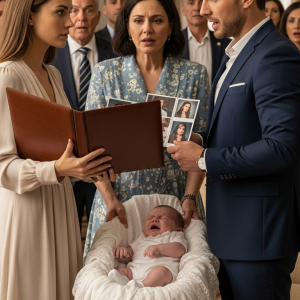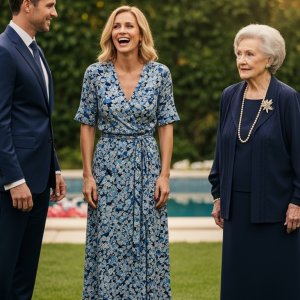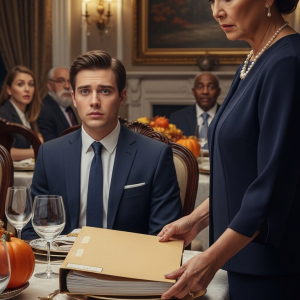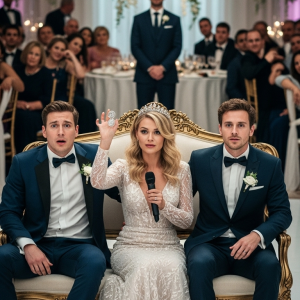The weeks following Robert Sterling’s funeral were filled with a hollow, performative grief. His children, Richard and Susan, moved through the grand family home on Chestnut Hill like ghosts cataloging their inheritance. They spoke in hushed tones about their father’s legacy, but their eyes held the unmistakable glint of speculators assessing an asset.
Their mother, Eleanor, watched them from the quiet periphery. For forty years, she had been the quintessential “corporate wife,” a graceful, smiling presence at charity galas and holiday parties. To the world, and even to her own children, she was the domestic architect of Robert’s life, the woman who ensured his home was a sanctuary, allowing him to focus on building his empire, Sterling Corp. They saw her as a loving, supportive, but ultimately simple woman, shielded from the complexities of the business world. They had no idea she had been its silent co-architect.
She remembered the late nights, decades ago, spread out on this very living room floor with Robert, surrounded by financial reports and blueprints. She, with her MBA from Stanford—a degree she earned before meeting him and rarely mentioned—was his most trusted, and only, secret advisor. It was her insight that had guided him away from a disastrous merger in the 80s, and her strategy that had propelled their expansion in the 90s.
“They see the trees, Richard and Susan,” Robert had told her one evening, just a few months before he passed, his voice thick with a disappointment he only ever showed to her. “They’re so focused on the next quarterly report, the next bonus. They can’t see the forest, Eleanor. The one we planted together.”
The first reading of the will was a brief, tidy affair. As expected, the personal assets were divided. The house, the cars, the art collection. Richard and Susan were pleased. The lawyer, Mr. Harris, had then cleared his throat. “And that concludes Part One of the estate settlement,” he’d announced. “An email will be sent regarding the reading of Part Two, which concerns Mr. Sterling’s corporate holdings and the dispensation of his controlling shares in Sterling Corp.”
Richard and Susan had exchanged a bored glance. “Just some corporate mumbo-jumbo,” Richard had whispered to his sister. “The accountants can handle that. We got the good stuff.” They had received the email notification for the second reading and had, without a second thought, deleted it. A fatal, arrogant mistake.
The sale of the house was swift and unsentimental. Richard and Susan, eager to liquidate, accepted the first reasonable offer from a developer who planned to tear it down and build two modern monstrosities. They showed no remorse in erasing the physical testament of their childhood for a quick profit.
They met their mother for lunch at a sterile, upscale restaurant to deliver the news and her “share.” Richard slid a check across the table. It was a respectable sum, but a fraction of the home’s total value.
“This should be more than enough to find a comfortable little place, Mom,” Richard said, his tone one of magnanimous generosity. “Something easy for you to manage. No stairs, perhaps.”
“We’re thinking of getting a boat,” Susan added, already scrolling through yacht listings on her phone. “Dad would have wanted us to enjoy the fruits of his labor, right?”
Eleanor looked at the check, then at the two children she had raised. They were not evil; they were simply hollow, their values shaped by a world of instant gratification and superficial success. They had inherited their father’s wealth, but none of his wisdom. She accepted the check with a quiet, dignified nod, her face an unreadable mask of calm. Her silence unnerved them, but they quickly dismissed it as the passive acceptance of an old woman who didn’t understand the world.
That Sunday, the 14th of September, Eleanor spent her last night in the cavernous, empty house. The ghosts of her life with Robert were everywhere. But she felt no sadness. She felt a cold, clear sense of purpose. She wasn’t grieving a house; she was preparing to save a legacy.
She went to the closet in the master bedroom and pulled out a garment bag that hadn’t been touched in years. Inside was a dark navy, impeccably tailored Armani suit she had bought for a business conference long ago. She laid it out carefully. Then, she made a call.
“Mr. Harris,” she said, her voice calm and steady. “It’s Eleanor Sterling. I just want to confirm everything is in place for tomorrow morning at nine a.m. sharp.”
On the other end, the old lawyer’s voice was warm with admiration. “Everything is in place, Eleanor. Are you sure you’re ready for this?”
Eleanor looked out the window at the forest her husband had so loved. “Robert’s work is at stake,” she replied. “I’ve been ready for forty years.”
Monday, September 15, 2025. The boardroom on the 40th floor of the Sterling Corp. tower was a testament to power. A long, polished mahogany table reflected the glittering city skyline. The board members, titans of industry, were all in their seats. At the head of the table, Richard Sterling, as acting CEO, was in his element. He was a perfect imitation of his father, all confidence and charisma, but without the underlying substance.
He was in the middle of a passionate, persuasive pitch for a high-risk, high-reward merger with a flashy tech startup. It was a deal that would gut the company’s manufacturing division—the very heart of his father’s original business—but would result in a massive, immediate payout for the executive board and major shareholders. It was a classic case of seeing the trees, not the forest.
“This is the future!” Richard declared, his arms spread wide. “This is how we take my father’s legacy and launch it into the 21st century!”
Right at that moment, the large double doors at the end of the boardroom swung open.
A profound silence fell over the room.
Eleanor Sterling walked in. She was not the grieving widow in muted pastels they had last seen at the funeral. The woman who entered the boardroom was a stranger to them all. She wore the dark navy power suit, her silver hair styled in a severe, elegant chignon. Her posture was erect, her gaze unwavering. She radiated an aura of absolute, quiet authority. Behind her walked the family’s old, stoic lawyer, Mr. Harris, carrying a leather briefcase.
Richard stared, his eloquent speech dying on his lips. He was flustered, annoyed. “Mom? What on earth are you doing here? This is a closed board meeting.”
Eleanor did not look at her son. Her gaze swept over the other board members, men who had known her for decades as Robert’s charming wife. “Good morning, gentlemen,” she said, her voice cool and steady. “Please, continue. I’m just here to observe. Although,” she paused, letting her eyes land on the voting tally sheet, “I believe there may be some confusion about the allocation of voting rights here.”
Richard forced a laugh, trying to regain control. “Mom, with all due respect, you don’t have any voting rights. This is company business. Perhaps you should wait outside.”
Eleanor gave a small, almost imperceptible signal to the lawyer. Mr. Harris stepped forward and placed his briefcase on the table, the sound of the latches clicking open echoing in the dead silence.
He pulled out a thick, notarized document, bound in a blue legal cover. He handed a copy to the lead counsel of the board.
“As some of you may be aware,” Mr. Harris began, his voice formal and resonant, “the final testament of Robert Sterling was divided into two parts. The first, concerning his personal estate, has been settled. My clients, Mr. Richard and Ms. Susan Sterling, chose not to attend the reading of the second part, which was held last Friday.”
Richard and Susan, who was also on the board and sitting near her brother, exchanged a confused, irritated glance.
Mr. Harris continued, his voice unwavering. “This document is the notarized result of that second reading. Per the final and irrevocable will of Robert Sterling, his entire personal stake in this company, a sum total of fifty-one percent of all voting shares, the controlling interest of Sterling Corp., is bequeathed in its entirety and with immediate effect to his wife, and most trusted partner, Mrs. Eleanor Sterling.”
The silence that followed was absolute, a vacuum where a billion-dollar company held its breath. The board members stared, first at the document, then at the quiet woman in the navy blue suit. The woman they thought was out shopping for a retirement apartment was, in fact, their new boss.
Eleanor finally turned her gaze to her children. For the first time, she looked directly at them, not as their mother, but as the chairwoman of their board. The warmth was gone, replaced by a cold, sharp, and deeply disappointed authority.
“As the majority shareholder,” she said, her voice cutting through the silence like a diamond, “I vote no on this merger. The legacy of this company is not for sale.”
She stood up, placing her hands on the back of her late husband’s chair at the head of the table.
“Furthermore, my first act as Chairwoman of the Board is to conduct a thorough review of executive performance. Richard. Susan.” She looked at them, her voice devoid of all emotion. “Your performance has been found wanting. You’re both fired. Effective immediately. Security will escort you out.”
The destruction was as swift as it was brutal. Two security guards, who had been waiting discreetly in the hall, entered the room. Richard and Susan sat frozen, their faces a mask of utter, uncomprehending horror. They were publicly and humiliatingly escorted from the boardroom of the company they had considered their birthright, past the stunned faces of their colleagues.
The story of the coup became the stuff of legend on Wall Street overnight. Richard and Susan were not just unemployed; they were pariahs, the greedy, foolish children who had so catastrophically underestimated their own mother that she had been forced to fire them to save their father’s company.
For Eleanor, there was no triumph, only a grim sense of duty fulfilled. She had not acted out of revenge, but out of love—love for her husband and for the company they had built together, a living entity that was more of a child to them than their own children had been.
At 68 years old, Eleanor Sterling formally took her seat as the Chairwoman of the Board of Sterling Corp. She did not take over the day-to-day operations. Her first move was to hire a new CEO, a brilliant woman from outside the company known for her ethical leadership and long-term vision.
Together, they dismantled Richard’s risky, short-sighted plans. They reinvested in the manufacturing divisions, protected the employees whose jobs had been on the chopping block, and steered the company back towards the core values of quality and integrity that Robert had instilled.
Freed from the emotional burden of her ungrateful children, Eleanor discovered a new life. She moved into a beautiful penthouse apartment overlooking the city—one she chose and paid for herself. She traveled. She became a major philanthropist, donating generously to causes her husband had cared about. She ran her empire with the quiet wisdom and formidable power that had always been there, hidden in plain sight.
One evening, she stood on her balcony, looking out at the city lights. In the distance, the Sterling Corp. tower stood tall, its name shining brightly against the dark sky. She had not only protected her husband’s legacy from the greed of their children; she had ensured its future. She, the silent partner, had finally stepped into the light, not for glory or for power, but because the forest needed a guardian.




